Lea Wait's Blog, page 28
October 18, 2024
Weekend Update: October 19-20, 2024
 Next week at Maine Crime Writers there will be posts by Sandra Neily (Monday), Kait Carson (Tuesday), Dick Cass (Thursday), and Matt Cost (Friday).
Next week at Maine Crime Writers there will be posts by Sandra Neily (Monday), Kait Carson (Tuesday), Dick Cass (Thursday), and Matt Cost (Friday).
In the news department, here’s what’s happening with some of us who blog regularly at Maine Crime Writers:
from Kaitlyn Dunnett: Looking for Halloween reading? Here’s a list you might like. And yes, one of my Liss MacCrimmon mysteries is on it. The Reviewer, Wonder Woman Sixty, is a long-time cozy mystery fan I’ve had the pleasure of meeting at a couple of past Malice Domestic conventions.
https://wonderwomensixty.com/cozy-mysteries-and-thrillers-for-the-spooky-season/
An invitation to readers of this blog: Do you have news relating to Maine, Crime, or Writing? We’d love to hear from you. Just comment below to share.
And a reminder: If your library, school, or organization is looking for a speaker, we are often available to talk about the writing process, research, where we get our ideas, and other mysteries of the business, along with the very popular “Making a Mystery” with audience participation, and “Casting Call: How We Staff Our Mysteries.” We also do programs on Zoom. Contact Kate Flora
October 17, 2024
Oct. 29: DYING FOR NEWS, 4th in Bernadette ‘Bernie’ O’Dea series
The plan this month was to post a scary or spooky scene from one of our books. I meant to. I really did. But I overthink posting scenes — the context, how scary really is it? Blah blah blah.
Also, I’m wicked busy in pre-launch work for DYING FOR NEWS, which will be released online Oct. 29, and should be available in stores by mid-November. Check out my website, maureenmilliken.com for more information.
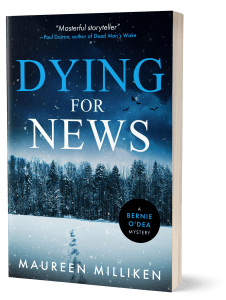
It’s not really a scary scene, but here’s the back cover matter…
THE DEAD OF WINTER…
When newspaper owner and editor Bernadette “Bernie” O’Dea’s house burns down on New Year’s Eve with an unidentified body in the charred rubble – who may or may not be her missing tenant – it’s clear the new year won’t be nice and quiet after all. So much for new year’s resolutions!
Bernie is already navigating boyfriend and police chief Pete Novotny’s increasingly challenging struggle with PTSD, so when the arson and murder investigation narrows its focus on her, she plunges into work trying to find an oasis of normalcy. Getting to the bottom of the local college’s plans for expansion is just the ticket.
Or not. What Bernie thought would be a simple story isn’t simple at all, and she begins to uncover a dark conspiracy, with tentacles that reach to every corner of Redimere, including into Pete’s troubled police department. The farther Bernie digs, the more tragic, and ultimately deadly, the consequences.
Sometimes there IS an ax murderer
Kate Flora: This month we’re sharing spooky, scary scenes from our books. Today I’m sharing a scene from the sixth Thea Kozak mystery, Stalking Death. To set the scene, Thea has been consulting for a private school where a black female student and star basketball player is being stalked by unknown persons. She traumatized but the administration doesn’t believe her. Then there is a murder and Thea is called in handle the public relations crisis. In this part of the book, she has identified the stalkers and the killer, and they have abducted her. She’s in the trunk of a car, far from anywhere. Injured and terrified.
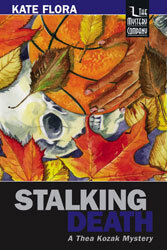 But ten minutes was too long for Alasdair. Suddenly, he turned away from his self-involved dance and came back to peer into the trunk. “She’s still in there? Come on. Let’s get her out. Let’s get this thing done. I’ve got a ride to catch.” In the hand swinging loosely by his side, he held an axe.
But ten minutes was too long for Alasdair. Suddenly, he turned away from his self-involved dance and came back to peer into the trunk. “She’s still in there? Come on. Let’s get her out. Let’s get this thing done. I’ve got a ride to catch.” In the hand swinging loosely by his side, he held an axe.
Fear exploded in me like dynamite. Far away, a siren moaned. Chambers and Woodson turned to look. I jerked at my hands, tearing through the last of the tape, pulled them apart, and pushed myself out of the trunk, springing past them and taking off down the road. I ran like the devil himself was chasing me. Or a crazy maniac with an axe. I ran for my life, straight down that dark and bumpy dirt road with three men chasing me, one of whom had a gun.
The words ‘broken field running’ were muttering in my head. A strategy to avoid giving Woodson a straight shot. But it was damned hard to zig and zag when I couldn’t see the ground. It seemed a better strategy to get off the road and into the woods. Sure, the sounds of my feet clomping over branches and rocks would be louder, but there would be lots of cover, too. As soon as I got around that curve I could dimly see up ahead.
I came around the curve and almost slammed into a car standing the roadway with its lights off. I didn’t wait to see if it was friend or foe or merely some local who’d come out to go parking or jack some deer. I thought I heard a voice yell “Hey,” but I wasn’t stopping for anyone or anything. Not until I’d put a good safe distance between myself and the guys with guns and axes.
I veered off the road into the woods, my arms raised before my face for protection. Branches slapped at my arms and snagged my hair. Sharp sticks scratched my cheeks and forehead and stabbed at my legs. Fallen branches and tangles of brush rose to trip me.
I moved through it all with the inexorable momentum of a juggernaut. Scraping, banging, and crashing my way deeper and deeper into the forest, tripping and falling and pushing myself up and going on, unable to hear whether I was still being followed because of all the noise I was making, and too afraid to stop and listen. Once, I heard what sounded like a gunshot. A commotion of voices shouting and then more shots.
When at last I paused to catch my breath, hands on my thighs, my chest on fire, I heard someone behind me and saw the broken beams of a flashlight filtered through the trees. Grimly, I used my sleeve to wipe the blood away from eyes and started off again. I ran until my chest was exploding and pain stabbed my side, the thud of my feet reverberating through my skull.
I ran for my life, and because training with Andre had made me strong, it was a hell of a run. All those hours in the gym were finally paying off. I ran through the trembling muscles and the cramps and the gasping, pushing on, looking for that second wind until I stumbled up a slope, tripped over a slippery rock at the top, and tumbled down the other side, landing hard on my hand and jarring my head.
I lay there on the spongy moss, groundwater seeping through my clothes, waiting for dizziness to subside so I could scramble up and go on. I could still hear my pursuer crashing through the woods. See those yellow beams getting closer, slicing through the forest like rays emanating from the hand of an evil wizard. I wobbled unsteadily to my feet, trying to pick out an escape route. He was so close now I could hear him panting. I crawled out of the open toward the darker shadows that meant brush, and shelter.
Suddenly, he was there at the top of the slope, the flashlight beaming down as he searched for me. I lay very still, glad I had dressed in black, hoping I just looked like more darkness, as the beam moved slowly over me and then moved away. My heart stopped when it found me. When the beating resumed, I thought he must be able to hear the thudding that filled my ears. Then the beam stopped and moved slowly back toward me and I heard Alasdair’s manic chuckle. “Gotcha! They promised me I’d get to do this and I’m going to.” For effect, he used the beam to illuminate the axe. All this way through the woods, he’d brought his favorite toy because Chambers and Woodson had told the little boy that if he was good and cooperated, he’d get to chop me up.
That must have been the conversation I hadn’t heard because they’d moved away. It would have defied belief if I hadn’t known all the events leading up to this. I scrambled to my feet, slightly blinded by the light, and staggered around, looking for something to use as a weapon. There are some good-sized rocks but I wanted a sturdy stick. Not much of a weapon against an axe, but it would keep him at a distance.
I hurried away from him, back into the woods, searching the dark forest floor until I found the darker shape of a branch. Alasdair followed at a leisurely pace, keeping me fixed in the beam of his light, chanting, “Run, run, as fast as you can. You can’t beat me, I’m the Gingerbread Man.” A vicious little monster with all the time in the world. Toying with me the way a cat plays a mouse.
October 14, 2024
A Very Fine House (but only one cat in the window)
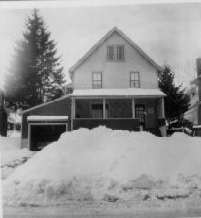 Kaitlyn Dunnett/Kathy Lynn Emerson here, again blogging with family photos, but this time there’s a difference. There is actually a connection to my mystery novels.
Kaitlyn Dunnett/Kathy Lynn Emerson here, again blogging with family photos, but this time there’s a difference. There is actually a connection to my mystery novels.
When I set out to write the Deadly Edits series as Kaitlyn Dunnett, I decided to make things easy on myself by giving Mikki Lincoln, my sixty-something sleuth, who is returning to the town where she grew up after fifty years away, a fair number of my own memories. I modeled her home town, Lenape Hollow, after my own, and gave Mikki the house I lived in from 1951 to 1965.
I loved that house, and had many fond memories of living there, but to write about it I had to do a little research. Although, as with most research for writing fiction, very little of it ended up in the story, what I discovered was of interest to me.
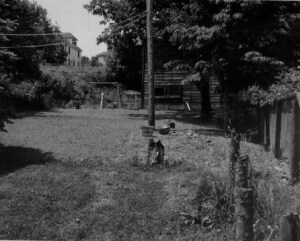 For one thing, I discovered that the size of the lot was only .22 acres. Somehow it always seemed bigger to me as a kid!. I was also able to identify the previous owner of the house as Frederick Thurmann (1877-1950). In census records, he’s variously listed as a carpenter, salesman, and owner of a butcher shop. In another source, there were indications that Thurmann’s store was boycotted during World War I because he was suspected of being a German sympathizer. Anti-German sentiment was also the reason the street his house was located on—Wedemeyer Terrace—was renamed Lincoln Place. I went back to Wedemeyer Terrace for Mikki’s address.
For one thing, I discovered that the size of the lot was only .22 acres. Somehow it always seemed bigger to me as a kid!. I was also able to identify the previous owner of the house as Frederick Thurmann (1877-1950). In census records, he’s variously listed as a carpenter, salesman, and owner of a butcher shop. In another source, there were indications that Thurmann’s store was boycotted during World War I because he was suspected of being a German sympathizer. Anti-German sentiment was also the reason the street his house was located on—Wedemeyer Terrace—was renamed Lincoln Place. I went back to Wedemeyer Terrace for Mikki’s address.
By the 1920 census, Thurman was living in the house my parents bought in 1951, but it appears in this photo to have been build some years earlier than that, at least to judge by the style of the ladies’ dresses. Whenever it was built, by the 1930 census the property was valued at $4000.

My parents and I moved in on June 24, 1951, when I was three years and eight months old. With us came our dog, Skippy, who was about a year older than I was. My father was a do-it-yourselfer and, among other things, remodeled the upstairs bath, added a half-bath downstairs, tore down an old barn and used the lumber to build an attached garage with storage space overhead that opened onto the front porch, and set up an office and a darkroom in the basement. The office came later, after we switched from coal to oil for the furnace. Coal had previously been delivered through a small window directly onto the floor in that section of the cellar!

In addition to the rooms I drew in a floorplan for Mikki’s house, mine had a root cellar at the foot of the stairs under the bulkhead door leading to the cellar from outside and an unfinished attic. The half on one side of the stairs was a playroom for me and in the other half there was a double bed made up in case of company. What’s marked as “guest bedroom (office)” on the floorplan was rented out to roomers, then housed my maternal grandfather from 1958-61, and finally became my room. It was perfect—I had my own little balcony and a huge walk-in closet.
Mikki, of course, made some changes. So did various owners after 1965. At one point, when the house was for sale, I found the realtor’s photos online and got quite a shock when I saw that the living-room fireplace my folks had sealed off had been opened up again—as I’d already had Mikki decide to do.
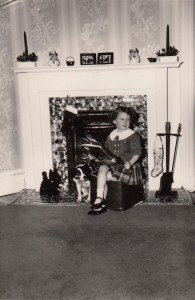

Lest I forget, yes we did have a cat. In 1958, along with my grandfather, Spot came to live with us. He led a very long life, later retiring to Florda with my parents.
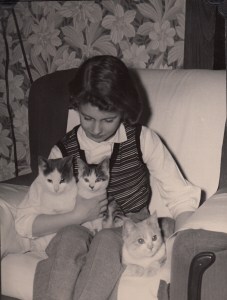
Spot in 1957 with his older brothers Jack and Pete, who went to live with a family friend
Kathy Lynn Emerson/Kaitlyn Dunnett has had sixty-four books traditionally published and has self published others. She won the Agatha Award and was an Anthony and Macavity finalist for best mystery nonfiction of 2008 for How to Write Killer Historical Mysteries and was an Agatha Award finalist in 2015 in the best mystery short story category. In 2023 she won the Lea Wait Award for “excellence and achievement” from the Maine Writers and Publishers Alliance. She was the Malice Domestic Guest of Honor in 2014. She is currently working on creating new omnibus e-book editions of her backlist titles. Her website is www.KathyLynnEmerson.com.
October 13, 2024
Cracking the Spine
Rob Kelley here, thinking about a writer’s reverence for books, at least this writer’s particular reverence.
Reading for me was the ultimate escape when I was a kid (still is!), and I would spend hours sitting on my bed devouring whatever I could get my hands on. I was the kid whose parents yelled to “go outside and get some sun,” and tried to find ways to stay off their radar, searching for a reading nook they didn’t yet know about.
Every year for my birthday I always asked for the same present: a gift certificate to the bookstore in our local mall. I would ration that thing hard, seeing how many books I could get out of $30. I also found used bookstores, little storefronts with bowed pine shelves packed with old pulp paperbacks (Science Fiction was my go-to genre then), adding 50 cent paperbacks to my collection, their pages yellow, their spines often cracked, pages loose in the binding.
That was fine, but I was never going to let that happen to my books. I’d take care not to open the fattest SF or Fantasy epic too widely when I read, so as not to leave even a crease on their cheap paper spines.
I brought my small collection with me to college, the books stacked and taking up precious dorm room space much to the confusion of my fellow engineering students. But college brought new used paperback stores and more books to add to the collection.
Then graduate school in English, and a new challenge: my assigned reading burden went through the roof. All the sudden I was devouring hundreds of books a year and I had to break one of the cardinal rules I had for myself: never write in a book.
I never wrote in textbooks if I could help it, certainly never defaced any of the fiction in my library. But fiction titles now were my textbooks, and I’d need to be able to scan and remember what I’d thought was important later. Plus, frankly, if you didn’t write down what you thought Joyce was actually saying when reading Ulysses, you’d never remember it when you returned to the passage.
After grad school I continued to collect books, and in a sign that we thought our marriage would probably last, Margot Anne Kelley and I finally combined our libraries. What that meant was that we had to periodically purge our collection (because, alas, Jorge Luis Borges’ “The Library of Babel” is fiction; in our reality we kept running out of room). That had unexpected repercussions, including selling Octavia Butler’s Parable of the Sower to a local used bookstore, only to unknowingly buy my own copy back a few months later when I wanted to read it again. And buying multiple copies of the same book that I was sure I didn’t already own? Yeah, that too.
But despite my absolute reverence for books, two things about my book habits have changed. First, I began to take my own writing seriously. And as many of us have discovered, that changes the experience of reading significantly. Instead of marking in books, now I keep a reading log of everything I read, including what I’m finding fascinating from a writerly perspective: scenes structures that knock me out, descriptions that are breathtaking, characters that inspire me to do better with my own. And have I given away a book that I logged only to find that I need to see that text again to better recall what I appreciated? Yep. I just did that with Tom Clancy’s Patriot Games, wanting to see the detail of a particular scene at the climax of the book.
The other thing that has changed for me is taking up piano. I’m still very much a beginner, so determining fingering and phrasing is part of my discipline. I started by scanning and printing out my scores so I could mark them up. Then my teacher showed me his scores, highly marked up, sometimes with erasures and remarking. And, in a moment of great personal growth, he got me to break the spines of the books, so they lay flat on the music desk on the piano. That one took some real effort to get over, but now I break the spines and mark up my sheet music.
But only in pencil, of course.
October 11, 2024
Weekend Update: October 12-13, 2024
 Next week at Maine Crime Writers there will be posts by Rob Kelley (Monday), Kaitlyn Dunnett/Kathy Lynn Emerson (Tuesday), Kate Flora (Thursday), and Maureen Milliken (Friday).
Next week at Maine Crime Writers there will be posts by Rob Kelley (Monday), Kaitlyn Dunnett/Kathy Lynn Emerson (Tuesday), Kate Flora (Thursday), and Maureen Milliken (Friday).
In the news department, here’s what’s happening with some of us who blog regularly at Maine Crime Writers:
All this month, to celebrate Halloween, we’re sharing scary scenes from our books. If you’ve missed some, you can go back to earlier posts. And don’t miss those that are coming. Vaughn’s was yesterday and it was a doozy.
Vaughn Hardacker will sign and sell books at Caribou High School on October 19 and 20 at the Caribou Fall Arts and Crafts fair.
Matt Cost finished the first draft of book two in the Max Creed series, EveryThing vs Max Creed. He pits wits and battles with a tech billionaire who is trying to take over the world by controlling the hearts and minds of people through a new app that triangulates personal data to predict and drive behavior. The first book, The Not So Merry Adventures of Max Creed publishes in April of 2025.
On Thursday, October 17th at 6:30, Cost will be participating in a mystery making panel at the Griffin Free Public Library in Auburn, New Hampshire.
Kate Flora: a while back, I offered a copy of my first published mystery, Chosen for Death, to someone who commented on the post. The winner is Elizabeth McHugh.
An invitation to readers of this blog: Do you have news relating to Maine, Crime, or Writing? We’d love to hear from you. Just comment below to share.
And a reminder: If your library, school, or organization is looking for a speaker, we are often available to talk about the writing process, research, where we get our ideas, and other mysteries of the business, along with the very popular “Making a Mystery” with audience participation, and “Casting Call: How We Staff Our Mysteries.” We also do programs on Zoom. Contact Kate Flora
October 10, 2024
Howl of The Wolf
 It’s October! In keeping with the season, Maine Crime Writers will share some of the scariest scenes from their work. They will post either in their personal posts or in a group post later in the month. In this post, I’m posting a section of the book I am working on now. It is my second novel featuring Native American Game Warden John Bear. John is a member of the Malaseet tribe (also known as the Wəlastəkwewiyik; I’m glad they shortened that!) of the Algonquin-speaking nation, which starts at the Canadian Maritimes and goes west to Minnesota. John is knowledgeable in Algonquin Myth and religion–including their Gods (called Manitous) and monsters. In the first novel, Wendigo (Finalist for 2018 Maine Literary Award – Crime Fiction Category), John deals with the evilest of Manitous. In the second, he’s taking on a Loup-Garou.
It’s October! In keeping with the season, Maine Crime Writers will share some of the scariest scenes from their work. They will post either in their personal posts or in a group post later in the month. In this post, I’m posting a section of the book I am working on now. It is my second novel featuring Native American Game Warden John Bear. John is a member of the Malaseet tribe (also known as the Wəlastəkwewiyik; I’m glad they shortened that!) of the Algonquin-speaking nation, which starts at the Canadian Maritimes and goes west to Minnesota. John is knowledgeable in Algonquin Myth and religion–including their Gods (called Manitous) and monsters. In the first novel, Wendigo (Finalist for 2018 Maine Literary Award – Crime Fiction Category), John deals with the evilest of Manitous. In the second, he’s taking on a Loup-Garou.
Some Background.
The Loup-Garou is a werewolf on steroids. There are two types of werewolves: the European and the American. The European version is common in Hollywood movies. There are some differences. Most people are familiar with the European, a vicious killer that is dependent on the appearance of the full moon to transform from human to wolf. When a wolf is an animal, it is usually killed with a silver bullet. The Loup-Garou is physically taller than its counterpart and is not moon-dependent. It can transform at will. I see some major differences in that the Loup-Garou can be defeated. Like the movie Werewolf, he can be killed with a silver bullet. However, unlike the European, the Loup-Garou maintains its human memories and human mind. It knows what it is doing and is known to make plans.
Here’s an excerpt from the 1st draft of my novel (working title:Loup-Garou).
Some background
Bethany Moore is a professional musher. She and her sled dogs live on a mountain away from people off-grid. At this point, she has already had a confrontation with the Loup-Garou, who killed her lead dog and ran off with the rest.
1:30 a.m. Bethany Moore’s Place, Violette Settlement, Maine. The wolfman returned to the woman’s den once again. He stood before a window, pressed his snout against the glass, and peered in. The inside was dark. The glow of the ashes burning in the fireplace was so weak it was barely visible. He returned to the yard and circled the empty dog pen. He raised his nose and sampled the air for any source of danger. Finding none, he trotted to the back, surveilling the house’s perimeter as he did.
 He found what he sought on the house’s western side: a bulkhead door fastened by a rusted set of hinges. He gripped the metal door by the handle and pulled. The door came free with a loud screech as the rusted nails anchoring the hinges against the wood frame broke free…
He found what he sought on the house’s western side: a bulkhead door fastened by a rusted set of hinges. He gripped the metal door by the handle and pulled. The door came free with a loud screech as the rusted nails anchoring the hinges against the wood frame broke free…
1:46 a.m. Moore sat up in bed and seemed bewildered. Something had awakened her, but she had no idea what it was. Although groggy from emerging from REM sleep, she sat still, listening. There was noise, ever so slight, coming from the cellar. She grabbed the silver-coated Bowie knife. Its sharp silver-coated blade sparkled in the moonlight from the window, and she slipped out of bed. Moore did not do anything that might alert the source of the sounds. She positioned herself beside the open doorway, leaned back until she was against the wall, and waited.
She heard steps on the creaky stairs leading to the cellar and pulled tight against the wall, making herself as small as possible. She knew that her chances of survival weren’t good. Still, she’d be double goddamned if she’d go down without inflicting damage to her attacker.
The cellar door opened, and she smelled the strong odor of a wild animal. A dark humanoid shadow crept through the threshold. Her breath caught as she saw the silhouette of a large animal—although this one walked upright—like a man. She heard a low growl from deep in its throat and knew Bear had been right when he told her what she was up against.
The dark shadow moved closer.
Moore gripped the knife and raised it above her head.
The shadow crossed the threshold and then stopped. Its nostrils expanded and contracted as it inhaled and exhaled her scent. While it was still confused by something, she struck, driving the blade deep into its back ….
1:50 a.m. The silver-coated blade struck bone, and the wounded werewolf’s howl of pain reverberated through the house. She ripped out the knife and drove it in again. The angered canid spun toward her. Its lips curled, and an aggressive snarl bared its fangs. Moore’s legs seemed to lose all strength when it hunkered down, and a deep, menacing growl came from deep inside its throat. Saliva dripped from the sharp canines and sparkled in the bright moonlight. She could see its eyes flash bright red as it thrashed, trying to reach the source of its agony.
She retreated toward her bed and grabbed the hatchet from the nightstand. The beast ceased trying to remove the knife and turned toward her. It dropped down into an attack position and slowly advanced.
Moore raised the hatchet and, when she believed the wolf was about to attack, drove it into the animal’s back beside the knife handle. The beast jumped back, lost balance, and fell to the floor. The impact extracted the knife, and it spun to face Moore again.
Freed of the agonizing blade, the wolf jumped forward, spun around, and leaped at her throat. It barely missed her, and its jaws shut with a loud SNAP. Driven by fear and anger, she struck again. Moore’s hands were covered in blood, making her grip on the hatchet slippery. The wolf’s sudden movement almost pulled the hatchet from Bethany’s hand, but she tightened her grip, retrieved it, and drove it home again.
This time, the hatchet barely missed the ravenous animal’s skull. The wolf slowly backed toward the door, and she followed, the hatchet raised like a tomahawk. She waved it back and forth, keeping the bloody blade in its line of sight, and slowly walked toward the wolfman.
The beast backed away from the deadly threat and began to change, becoming less of a wolf and more human. When it reached the open cellar door, it was more man than a wolf. Moore’s legs trembled from exertion and fright, yet she stood her ground. She knew from experience with large animals that showing fear would only encourage the beast. She screamed at it, “Back! Back!” At the same time, she raised the hatchet to ward off another attack.
Rather than charge, the animal spun around, darted down the stairs, and disappeared into the black void. She wanted to follow, to ensure it was gone, but her bare foot slipped in a pool of blood. Moore caught her balance, then turned, raced into her bedroom, shut the door, and braced her back against it. She saw a black form run across the moonlit snow through the window across the room.
For at least five minutes, she stayed put. Hearing nothing, she reached down, grabbed the Bowie knife, and ventured out of the bedroom with the knife in one hand and the small ax in the other. Moving slowly, Moore turned on the ceiling light in the hall and saw the bloody footprint where she’d stepped in the pool of blood on the hardwood floor. She cautiously checked the entire house to convince herself the attacker had left.
Satisfied she was alone, she entered her kitchen and turned on a light. She saw blood covering her hands and the front of her nightgown. She ran into the bathroom, ripped the nightie off, and threw it to the floor. She turned on the shower and waited for the water to become so hot it could scorch her. She stepped into the water, grabbed a soap bar, and scoured her hands and forearms. When satisfied that she was as clean as possible, she returned to the bedroom and got a robe.
She returned to the living room, thanked God for the cell tower in Violette Settlement, and called John Bear. When she finished her phone call, she heard a noise from the dog kennel. She was surprised at how clear and loud the slightest sounds were for a brief moment. With the knife in hand, she walked out the door and to the end of the porch. She immediately recognized what she’d heard—her dogs were back in their pen. She approached the enclosure and stopped when she saw her dogs backing away in a submissive posture. It was as if they feared her.
Her feet grew cold in the snow, and she reversed course, returning to the cabin.

The Werewolf who lives with me!
Crossing Genres: A Good Idea?
Do you prefer to read books that cross genres? I wrote a novel that mixed psychological fiction with science fiction and found it a hard sell. Despite that, I still feel strongly that it is a good book.
The problem today is that novels are placed into hard-and-fast categories. This is done for increased sales, of course. Money drives the publishing market more than ever, and when a book crosses genres it makes it harder to market the book. This detective novels stay in their lane, as do psychological thrillers stay in their own lane. Only if you are a big name author can you mix and match, and get away with it. Take Stephen King. He frequently combines horror with other genres, including crime.
It only happens when some publisher goes out in a limb and actually publishes a novel that mixes two different genres. And then when it sells, every publisher will go looking for the next werewolf love story. Or science fiction detective tale. It reminds me of back in the 90s when the Seattle grunge sound came out. Every record producer in the country flocked to the Northwest to find the next Nirvana.
So for now, I’m going to take this manuscript featuring an AI humanoid in a domestic situation, and put it the drawer. It’s made me rethink whether I should be mixing genres. For now I’ll stick to the tried and true. Stick to crime.
The good news is that my new novel will be coming out in November. It’s called Cruel & Bitter Things and is the first book in the series. It features Gwynn Denning, a mother, wife and director of a group home for troubled children. On the surface, it appears that she’s living the perfect life. But what no one knows is that Gwynn is a serial killer who dispatches bad people (and sometimes not so bad people if they threaten to reveal her secret). I’ll keep you updated.
So have a great fall. Until next time . . .
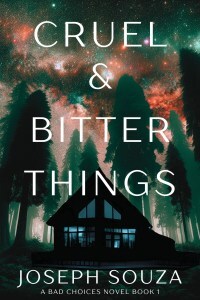
October 8, 2024
A HORRIFIC TIME FOR DEE ROMMEL; Found in the third book – 8 DAYS – of the Dee Rommel Mystery Series
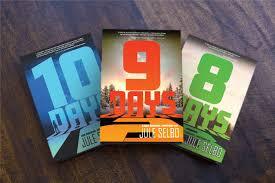
Kate Flora, intrepid leader of the blog suggested we share a portion of one of our books that has a HORROR element. The Crime/Mystery genre can include danger, near-demise moments for sure … this is one I picked to share for 2024 HALLOWEEN!
JUST A LITTLE SET-UP:
8 DAYS, A Dee Rommel Mystery (third in the ten-part series) focuses on a human/sex trafficking ring in Portland, Maine. The impetus for exploring the subject came from my regular meetings with “my” former PPD officers and our talks about how this crime is ‘hidden’, but is, unfortunately, very present. Dee Rommel, my PI heroine, hired to protect a targeted youth, gets pulled into flushing out the traffickers – and finds herself held captive. A disturbing villain wants to torment Dee and hands her over to Pergo, her gross henchman… Steph is a damaged woman who was trafficked in her teens; she and Dee have been in a cat and mouse battle. (This won’t spoil the full story, but welcome to Dee’s HORROR EXPERIENCE in 8 DAYS.) The excerpt is midway through Chapter Thirty-Six.
…Steph takes three bottles of pills from her bag, places them on the top of a box. “Maybe it’d be interesting for you to know just how good my kids have it.”
She motions to Pergo. He takes his knife from his pocket, his thumb presses against the safety, the blade pops out of the handle. It’s well-sharpened. Steph shakes a pill from each bottle, places them within Pergo’s reach. He takes a water bottle from his back pocket, places it on the box, then steps behind me, grabs my hair and pulls my head back. “Gonna give you a good time.”
I press my lips together. He leans over me, uses the end of the blade to prick my lips. I pull back but stop when the blade goes deeper. “Open up.”
I bite down harder. He stabs the knife into the wall next to my head – too close – and uses his fingers to dig into my mouth.
“Time to take a trip. You’ll go very very high.”
Two of his meaty digits get into the corner of my mouth, his grip is strong, and my jaw can’t hold. He pushes the pills onto my tongue. I try to spit – he clamps my mouth shut, grabs the water bottle, holds my nose, waits for me to try grab air through my mouth and jams the water bottle through my lips.
I gag, and swallow. Didn’t mean to, reflex took over.
A horn is honked. Steph taps Pergo. “She already knows what it feels like to have something cut off. That won’t send the message I want her to live with…”
“What do you want me to live with?” I spit out.
“That I won.”
Steph walks to the ramp, turns back to survey me.
“Someone has to win. So glad it’s me.”
My vision is changing. She’s a blur. My body tingles.
The blur turns to Pergo and her voice sounds like an echo. “Make sure you arrange enough time for her to think about that.”
A salute. Accompanied by a fart.
Stinks. He stinks. The smell surrounds me, I can almost see it.
Pergo puts a dark bag over my head, wraps a thick cord at the bottom of it so it is tight around my neck. He yanks me to my feet and I feel almost weightless, like I have a secret power.
I can’t see who’s driving the van, is it the big guy who smelled like meat and onions? My secret power tells me I’m in the cargo area and that Pergo is sitting next to me. I decide not to tell him the pills are having no effect. And that I can truly see through the bag, see a brilliantly gold sunset and red clouds shaped like puffy cupped hands holding the golden globe – fluffy hands tossing it into the air and spinning it and catching it, over and over. And that there’s a chorus of crows there. I make a wish and a halo of light swooshes through the van’s walls towards me – when I give the say-so, the light will melt away the duct-tape around my hands. I won’t tell Pergo the blond hairs that dot my skin, from knuckles to lower arm, are there for the green ants. I feel their nibbling on my skin. I know – on my say-so – the ants will poison him. He thought the pills would weaken me. No luck with that. The only effect of the pills is dry mouth. I could tell him I’d like a glass of water, but I don’t think he’d care. What he might care about is the fact that my mother has arrived from Boston and sits across from me – in the van – and that she’s shaking her head. “Honey, your father and I always wanted you to do exactly what challenges you, what makes you happy. Now that your dad is gone, I feel it’s my job to remind you to make wise choices. Do you really want to be sitting in the back of this van with a bag over your head?” I whisper to her that it’s not at the top on my list of fun things to do, but it’s okay because the bag over my head gives me superpowers.
“Shut up,” says Pergo. “Who you talking to?”
My mother rolls her eyes. “He shouldn’t pick at his acne. He’ll get scarred. But we don’t care.”
I laugh.
“You always like puzzles, honey,” my mother continues. She’s dressed for work, in a gray suit and pink blouse and coral earrings and her hair is as it always is – never a strand out of place. Her briefcase is on her lap and there’s a plane ticket to Paris in her hand. She enjoys elegance, wishes I did. “And you always liked to get yourself caught in a tree or stuck at the bottom of a rock pile in Acadia National Park so you’d have to work your way up and out. You like steep hills with no stairways. I’m very happy with an escalator. But you, honey, you sometimes choose the hard way. I wonder about that sometimes.”
“Me too,” I say.
“Will you come visit soon, honey?” she goes on. “I wish you’d move to Boston, pick one of the law schools and study here…”
“I’m really busy,” I say. “Making sure someone who deserves it, gets put into prison.”
“Shut up!” says Pergo. “I got my knife right here and I will cut out your tongue if you don’t stop talking.”
Thousands of mini-Pergos line the ceiling of the van. Each has a knife in hand. One of them is squatting like the weird Gollum in Lord of the Rings – glaring at me and saying, “Killing’s not my problem, it’s the not killing that’s the problem for me.” He shows yellow teeth and I projectile vomit – it jets upwards into his face. “That shows I have a problem with you,” I yell triumphantly.
One of the Pergos leaps down, becomes human-sized and he raps on the wall between the driver and cargo area. The van swerves, the road gets bumpy. No more smooth blacktop. The vehicle slows down – comes to a stop.
I hear Pergo pulling the van door open. He grunts, he’s getting on his haunches, very close to me. His hands go under my armpits, and he lifts me up. We’re standing in the open door and the wind is zinging at me. It smells woodsy and dead leaf-y and wet. This must be the moment where my superpower and I will fly, save the planet and head back to Krypton. Or Mars. Or Saturn – that might be pretty. I tell Pergo I’ve decided not to save him because he’s rude. No rude people allowed on Saturn. “Shut up,” he says. Then he pushes me. And I’m flying.
There’s no ground under me, I’m moving through air. The wings attached to my neck won’t activate, probably because I’m too thirsty but still, this soaring feels good. So good. My arms and legs detach and fly off on their own; it’s odd that my torso’s wings don’t become functional. Whatever. I will float down. No big deal.
Ooomph. That hurt. Right on the coccyx. I’m on the side of a steep hill and a sharp rock jams into my back, I tumble downwards. It feels like I’m going too fast. Down. Down. Body rolling, hitting hard things. Finally, I slam into a tree and my body jolts and bounces to one side. My head hits water and reeds. A marsh? All is water-soaked. The rest of my body lands close by and with my superpower I command the pieces to re-attach.
They do. I’m one body again.
My left leg is attached backwards. Hurts like hell.
CHAPTER THIRTY- SEVEN
Maybe I passed out? Opening my eyes takes a Herculean effort. The back of my head is in the shallow water. If I’d tumbled one more rotation, I would’ve landed face-first and I would have had to rely on the aliens that live in the trees to help me turn over. But aliens can be unpredictable, they may have watched me drown. So lucky I’m face up.
My left leg feels like it’s been spun in a Floss Maker like cotton candy, they are pointing uphill. My head is lower and feels filled with blood. Cold water seeps through my jacket and shirt, but I can’t turn to drink because there’s a bag over my head. My power source. My personal X-Men accoutrement. Now it’s magnifying sounds. Frogs? Some people think they’re luck. Some people think they carry curses. Some people think they bring fertility. Perhaps a frog will whisper in my ear and let me know what its secret is.
There’s a tongue lapping in the water next to me. A fox? A groundhog? “Don’t be afraid of the bag on my head,” I say. “I only bring good.”
My ears hear a snake slither by in the water, it flips its tail across my neck. I’m really invading a space that does not belong to me. “Sorry. I know I wasn’t invited.”
Test the abs? Will my hundred sits-ups a day pay off? I summon the halo again; it lightens my head, and I crunch. Shoulders up. Chest up. Ribs up. I get myself bent in half, force myself to fall to the side, out of the water. My head drops onto a rock. Rip! The bag rips open. My heart sinks. My power source might be destroyed. I shake my head, the fabric clears my nose and eyes and mouth, and I breathe in insects.
A warm, thick fluid drips down my face. Blood? Do people with superpowers bleed? A face descends upon mine, and it’s got eyes that glow in the dark. “Don’t lick my blood!” I yell. The creature skitters away.
The tree ahead beckons me. The rough bark on its trunk moves like jaws, opening and closing. But it’s a smile. I think it wants to help. Since I’m still on the incline, I can’t roll up to it. The rock that banged my head is still there, it’s sharp. I raise my arms and drop the duct tape on my wrists on it. Move my arms in a sawing motion. The rock’s sharp edge – will it cut through the tape? “Give me a minute, give me a minute,” I tell the demanding tree. “Hold your horses.”
I saw until my breathing hurts. Keep going. Keep going. Finally, there’s a tear in the thick sticky tape. I bend to it, get hold of an end with my teeth. Pull? Or chew like a beaver? I wonder if a beaver is close, one that might finish the job? One does not show itself.
Sound of an owl tooting and hoo-ing.
A nighthawk caws.
I use my teeth to pull the rest of the duct tape off my wrists. Air hits a fresh raw layer of epidermis and it stings. Stings. Stings.
“Come here,” says the tree.
“Give me a minute,” I tell it.
I use my elbows and the heels of my hands and my long fingers to dig into the damp, cold soil and scrunch, pull, haul myself to the tree. I can’t find a foothold; the hill’s too steep and slippery, and my cotton candy left leg is not in the right position. But I can wrap my arms around the tree trunk. Get my shoulder against it. Hug it. I get my right leg bent, my cheek to the rough bark. Hug higher. Move my chest against the rough bark of the tree. Inch higher. My right knee and foot are pressing into the earth. All creatures have rights, I think. Trees. Nightbirds. Beetles and snakes and ants. Am I crushing a life as I work to find balance? “Sorry,” I say.
This will take hours. But what’s one hour or ten? Does time matter? I lose track of it, but finally I’m standing next to my tree. My head hurts but I focus on the steep hill where I balance. It must crest somewhere. I push from tree to tree, from rock to rock. I want to get to the top and I want a road. It’s like when I was a kid and suddenly wanted ice cream and I couldn’t think of anything else. Now I want a road.
I’ve reached the crown.
It’s dark.
There’s a narrow road. No cars. What direction to limp? What direction to drag my leg? I have no idea.
I see headlights. Ah – maybe I can flag the vehicle down. I stumble into the middle of the road, thinking the residual light of my halo will be my helpmate.
Car’s not stopping. Not stopping. “Hey!” My voice is thin. “Hey!”
The car screeches to a stop. A deep voice roars out: “You stupid? What the hell are you doing, stupid?”
I don’t care what names he calls me. I grin. I’m glad to not be run over.
“Hi,” I manage and do a little dance. I don’t normally dance, but I’m moving my legs, swaying my hips. I sing, “Can you give me a ride? I want to go home.”
“What?”
Maybe I’m not singing loud enough. “Can you…?”
The driver lays on a horn. “Get off the road,” he yells.
The passenger door opens and a little old lady in jeans and a sweatshirt gets out. She’s got blue hair and glasses, and she could be a fairy godmother if she had a wand.
“Sugar, you gotta get out of the road,” she says.
“Hi.” Despite my exhaustion, I manufacture a hopeful help-me look.
The driver gets out. He wears overalls and a flannel shirt. These are not fairy godparents. More like overgrown trolls. Magnanimous, I hope. They’re magical, because there’s a light that shines behind them.
“What did you say?” the Granny Troll yells.
“She’s probably on drugs,” he says.
“She looks like she’s been rolling around in the woods,” she says. “Do you think she sleeps in there?”
“I don’t know.” He yells at me. “Get out of the road before you get run over, stupid!”
“Maybe she needs help,” the woman worries.
He’s not so generous. “What if she wants to rob us?”
“Clive, what if she really needs help? If she’s been sleeping in the woods, she probably has mental problems.”
“That we don’t need. We can back up and take the side road over to the highway.”
Granny Troll’s really concerned. “Someone else might run her over.”
“She’s not getting into our car.”
“Not even in the back? We could drop her off at town.”
“I don’t damn want her in my damn car.”
“We have to do something,” she says. “What should we do?”
“Call 911. Report her.”
Words that are music to my ears. A cop. A fireman. A state trooper. I don’t care. Someone who will know what to do with me.
*** This was fun to write because Dee is in an altered state, but I can bring up parts of her past, her relationships and flights of delusion – while making the danger still clear.





Dee experiences the after-effects of the drugs – but in true fashion, finds a way accomplish the goal.
HAPPY HAPPY HAPPY HALLOWEEN!
October 7, 2024
Who Stole the Wallpaper?

Defeated stump with brush pile behind it.
John Clark is staring at his wall of creativity and shaking his head. It has always been nicely covered with an ever-changing patina of writing ideas, but this time, it’s blank. I know from experience that this is a temporary phenomenon, but annoying nonetheless.
It’s not like life is dull and boring. I’m driving a local house candidate around every Wednesday afternoon so she can knock on doors. I mentor a young man at the Alfond Center every Thursday afternoon, and I run an AA meeting the first Monday of the month at the Somerset County Jail. These are satisfying and give back to the world, but don’t merit a full blog.
I have a lot of fun finding bargains at library book sales and an occasional lawn/estate sale, plus help out friends/libraries/organizations who are too busy or overwhelmed to sell online. I love the challenge of turning what others think is dross, into money. (just sold a bunch of 3-D football cards an hour ago for $30. My cost was 0 because a friend wanted to get rid of them).
Who would care about my giving in and buying an expensive gaming laptop (64GB ram, 8 TB SSD) so I can waste hours playing the accumulation of role playing games I’ve never tried because my old laptop wasn’t powerful enough?
Then there’s our ambitious backyard project. We bought the ½ acre lot right behind us to ensure privacy and have an area that will give us and our grandkids a natural playground. It hadn’t been touched for years, save for serving as a dumping ground for unwanted trees and brush. When we first moved here in 2019, it was invisible due to overgrowth on out side of the property line. That led to the summer of endless itch, thanks to poison ivy and browntail moth hairs. It was so bad that at one point I was tempted to cut off both arms, but couldn’t figure out how to do so.
This time around, the cleanup involved cutting small trees and brush, bucking up two trees that fell during the big storm last winter, plus cutting a bunch of long dead fallen trees and a few that hadn’t toppled yet. The result was two big piles, one of logs, the other of brush, and the rental next month, of a 30 cubic yard dumpster coupled with a family clean-up day. I also spent weeks slowly hacking and cutting away at the monster maple stump and six feet of trunk that was left after the 2019 cutting spree.
That was an adventure all by itself. It involved making cuts, both vertical and horizontal and using a crowbar to pry pieces loose. In the process, my right arm took a beating every time the crowbar slipped and took a chunk out of my ever thinning skin. It looked so bad at one point where I was tempted to get a t-shirt that said “Blood, Sweat, But No Tears.”
Then there was the ‘blinding flash of the obvious’ that happened two days ago. We planted two of what I thought were self-pollination prune plum trees. When we were cleaning out a drawer, Beth found the tag and asked me if we needed to keep it. I read the tag and discovered both trees were Italian Plums that need another type to pollinate and bear fruit. Too late to buy one this year, so now I have to hope I live long enough to have my own plums again.
In between starting to write this, I’ve written 150 of the 200 postcards I agreed to make out and send to swing voters urging them to vote. This time they’ll go to Nevada, unlike the batch two years ago that went to Virginia.

150 down, 50 to go
Finally, while tossing chunks of dead, dry wood onto the to-be-burned pile, I got an idea for an essay to submit to Topsham Library’s “Joy of The Pen” writing contest. I submitted it in the creative nonfiction category, as well as entering the fiction category with the first three chapters of an in-process book called Highly Unlikely.
AND…If you like fantasy, you might want to read my new serialization on Substack https://songthresher.substack.com/p/like-a-thief-in-the-night-the-further
I guess that wall wasn’t as blank as I first thought. What’s on your Wall of Creativity these days?
Lea Wait's Blog
- Lea Wait's profile
- 508 followers



